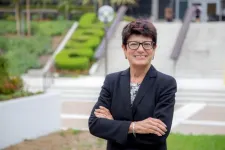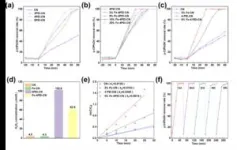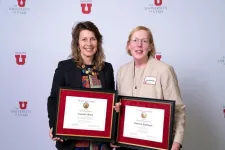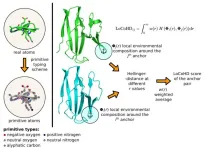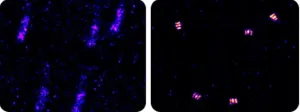(Press-News.org) Carolyn C. Meltzer, MD, dean of the Keck School of Medicine of USC, has been appointed to the board overseeing the California Institute of Regenerative Medicine (CIRM). CIRM is the voter-created agency that funds stem cell research throughout the state.
“Stem cell research holds the tremendous promise to unlock health solutions that patients need,” said Steven D. Shapiro, MD, USC’s senior vice president for health affairs. “The CIRM board—and the people of our state—will benefit greatly from Meltzer’s wide-ranging leadership experience and place at the forefront of her field. I look forward to the big leaps forward that California regenerative medicine will take with her guidance.”
Meltzer was appointed to the CIRM board by State Controller Malia M. Cohen. In all, there are 35 Californians on the board, encompassing patients, advocates, researchers, educators and professionals from the biotechnology industry — all dedicated to accelerating world-class science to deliver transformative regenerative medicine treatments. CIRM invested $486.3 million in discovery, translational and clinical research, as well as education and infrastructure, during the 2023–2024 fiscal year.
“It’s an honor to be called to service on behalf of the people of California,” said Meltzer, holder of the May S. and John H. Hooval, M.D., Dean’s Chair and professor of radiology in the Keck School. “We’re in the midst of an age of discovery in medicine, with game-changing potential for addressing the gamut of serious disease. CIRM has been a major driver of progress in stem cell science and regenerative medicine, and I look forward to collaborating with my colleagues there to create the greatest health impact possible for all.”
The members of CIRM’s board serve on 11 subcommittees and on the three working groups that provide recommendations regarding CIRM funding, ethical standards and facilities.
Meltzer is an expert in neuroradiology and nuclear medicine and has conducted research to understand the brain’s structure and function during normal aging, Alzheimer’s disease and psychiatric disorders in later life. She also specializes in optimizing new technologies to benefit human health, including the assessment of artificial intelligence (AI) tools in medical imaging and overseeing the clinical evaluation of the world’s first combined PET (positron emission tomography)/CT (computed tomography); this latter technology has revolutionized the diagnosis and treatment monitoring of patients with cancer.
She has received numerous awards and honors, including the Distinguished Service Award from the American Medical Association, the Gold Medal Award from the Association of University Radiologists and the Outstanding Researcher Award and Gold Medal from the American Society of Neuroradiology. She is a fellow of the American Association for the Advancement of Science and a member of the Academy Council of Distinguished Investigators in the Academy for Radiology and Biomedical Imaging Research.
Meltzer earned her medical degree from Johns Hopkins University School of Medicine and completed her graduate medical education at Johns Hopkins Hospital in Baltimore. She holds an undergraduate degree in biology and neurobiology with honors from Cornell University.
CIRM was established in 2004 with the voter-approved Proposition 71. New funding was authorized by the people of California in November 2020 through Proposition 14, called the Stem Cell Research Institute Bond Initiative, which allowed for additional grants, strengthened oversight and an expanded governing board. Meltzer was appointed to a position on the CIRM board that is designated for an executive officer of a California research institute.
END
USC medical school dean appointed to CIRM board
Acclaimed higher-ed leader, researcher and neuroradiologist Carolyn C. Meltzer, MD, who leads the Keck School of Medicine of USC, takes on a governance role with California’s state stem cell agency.
2024-05-30
ELSE PRESS RELEASES FROM THIS DATE:
Antibiotic pollution disrupts the gut microbiome and blocks memory in aquatic snails
2024-05-30
Antibiotics prevent snails from forming new memories by disrupting their gut microbiome - the community of beneficial bacteria found in their guts.
The new research, led by the University of East Anglia (UEA) in collaboration with Aberystwyth University, highlights the damaging effects that human pollution could be having on aquatic wildlife.
In the study, pond snails were given a favourite food – carrot juice – but had to quickly learn and remember that it was no longer safe to eat.
Snails ...
Researchers expose new symbiosis origin theories, identify experimental systems for plant life
2024-05-30
STARKVILLE, Miss.— A Mississippi State faculty member’s work on symbiosis—a mutually beneficial relationship between living organisms—is pushing back against the newer theory of a “single-origin” of root nodule symbiosis (RNS)—that all symbiosis between plant root nodules and nitrogen-fixing bacteria stems from one point—instead suggesting a “multiple-origin” theory of symbiosis which opens a better understanding for genetically engineering crops.
Ryan A. Folk, an assistant professor in the MSU Department of Biological Sciences and herbarium curator, is an author on a paper published this month in Nature ...
Q&A: How AI affects kids’ creativity
2024-05-30
Shortly after artificial intelligence models including Midjourney and OpenAI’s Dall-E went public, AI-generated art started winning competitions: one in digital art, another in photography. Concern rumbled that AI could replace artists — and even, by some metrics, be more creative than humans. But simultaneously, people were exploring these tools as ways to augment their creative processes, not replace them.
University of Washington researchers grew curious about how AI might affect creativity in children, specifically, so they worked with a group of 12 Seattle-area kids ages seven to 13 to explore how the kids’ creative processes interacted ...
Virtual lab meetings improve undergraduate research experience and foster diversity in academia
2024-05-30
Moisés A. Bernal, assistant professor in the Department of Biological Sciences at Auburn University, is collaborating with researchers Kathleen Lotterhos (Northeast University), Megan Phifer-Rixey (Drexel University), and Torrance Hanley, (Sacred Heart University) to evaluate the effectiveness of virtual lab meetings in demystifying the hidden curriculum in academia, incentivize primary research among students without previous experience, and foster participation of underrepresented groups in STEM.
The “Biological Practices” article entitled A virtual lab meeting training program mutually benefits mentees and host labs was recently published ...
Study shows effectiveness of updated COVID-19 vaccines wanes moderately over time, is lower against currently circulating variants
2024-05-30
May 29, 2024
Boosters that target the omicron subvariants of SARS-CoV-2 are still providing reasonably durable protection against infection, hospitalization and death from COVID-19, according to new data from a study led by researchers at the UNC Gillings School of Global Public Health.
Published today in the New England Journal of Medicine, the study found that COVID-19 boosters targeting the XBB.1.5 subvariants were most effective one month after receiving one. After four weeks, the vaccines were 52.2% effective at preventing infection and 66.8% effective at preventing hospitalization.
The vaccines were also highly effective ...
Researchers expose new ‘origin’ theories, identify experimental systems for plant life
2024-05-29
STARKVILLE, Miss.—A Mississippi State faculty member’s work on plant life symbiosis—a mutually beneficial relationship between living organisms—is pushing back against the newer theory of “single-origin”—that all life stems from one point—instead suggesting “multiple-origin” theory which opens a better understanding for genetically engineering crops.
Ryan A. Folk, an assistant professor in the MSU Department of Biological Sciences and herbarium curator, is an author on a paper published this month in ...
Researchers honored for outstanding contributions to cancer care
2024-05-29
Three Huntsman Cancer Institute researchers have recently been recognized for their work as outstanding faculty members at the University of Utah (the U).
Kim Kaphingst, ScD, director of cancer communication research at Huntsman Cancer Institute and professor of communication at the U, and June Round, PhD, investigator at Huntsman Cancer Institute and professor of microbiology and immunology at the U, were both granted the 2024 Distinguished Research Award. The faculty prize is given annually to scholars who exemplify exceptional research.
Kaphingst’s group explores cancer communication, particularly how to educate patients and families who ...
A new Hungarian method may aid protein research
2024-05-29
In a paper recently published in Nature Communications, the HUN-REN-ELTE Protein Modeling Research Group (Institute of Chemistry) has laid the foundations for a mathematical method, allowing the computer-assisted comparison of the three-dimensional structures of proteins. The method is unique in that while the alternatives available so far only took into account the position of the atoms, the new technique, called LoCoHD (Local Composition Hellinger Distance), also includes the chemical information of the atoms.
Proteins are molecular machines that carry out processes necessary for cells to function, acting as molecular switches, transcribing information ...
AIM algorithm enhances super-resolution microscope images in real time
2024-05-29
When trying to measure molecular structures with nanometer precision, every bit of noise shows up in the data: someone walking past the microscope, tiny vibrations in the building and even the traffic outside. A new processing technique removes noise from optical microscope data in real time, allowing scientists to track individual molecules over 10 times more precisely than was possible before.
A team of bioengineering researchers at the University of Illinois Urbana-Champaign has introduced an algorithm called adaptive intersection maximization, or AIM, that removes high-frequency ...
Rice researchers uncover surprising role of opioid receptors in gut development
2024-05-29
Researchers at Rice University have revealed a previously unknown function of opioid receptors in the development of the enteric nervous system (ENS), often referred to as the “brain in the gut.” This discovery challenges conventional understanding of opioid receptors, shedding new light on their significance beyond pain management and addiction.
Led by Rosa Uribe, an assistant professor of biosciences at Rice and a Cancer Prevention and Research Institute of Texas (CPRIT) Scholar, the research team identified the genes critical for ENS development by conducting a series of experiments using zebrafish ...
LAST 30 PRESS RELEASES:
Stem cells from human baby teeth show promise for treating cerebral palsy
Chimps’ love for crystals could help us understand our own ancestors’ fascination with these stones
Vaginal estrogen therapy not linked to cancer recurrence in survivors of endometrial cancer
How estrogen helps protect women from high blood pressure
Breaking the efficiency barrier: Researchers propose multi-stage solar system to harness the full spectrum
A new name, a new beginning: Building a green energy future together
From algorithms to atoms: How artificial intelligence is accelerating the discovery of next-generation energy materials
Loneliness linked to fear of embarrassment: teen research
New MOH–NUS Fellowship launched to strengthen everyday ethics in Singapore’s healthcare sector
Sungkyunkwan University researchers develop next-generation transparent electrode without rare metal indium
What's going on inside quantum computers?: New method simplifies process tomography
This ancient plant-eater had a twisted jaw and sideways-facing teeth
Jackdaw chicks listen to adults to learn about predators
Toxic algal bloom has taken a heavy toll on mental health
Beyond silicon: SKKU team presents Indium Selenide roadmap for ultra-low-power AI and quantum computing
Sugar comforts newborn babies during painful procedures
Pollen exposure linked to poorer exam results taken at the end of secondary school
7 hours 18 mins may be optimal sleep length for avoiding type 2 diabetes precursor
Around 6 deaths a year linked to clubbing in the UK
Children’s development set back years by Covid lockdowns, study reveals
Four decades of data give unique insight into the Sun’s inner life
Urban trees can absorb more CO₂ than cars emit during summer
Fund for Science and Technology awards $15 million to Scripps Oceanography
New NIH grant advances Lupus protein research
New farm-scale biochar system could cut agricultural emissions by 75 percent while removing carbon from the atmosphere
From herbal waste to high performance clean water material: Turning traditional medicine residues into powerful biochar
New sulfur-iron biochar shows powerful ability to lock up arsenic and cadmium in contaminated soils
AI-driven chart review accurately identifies potential rare disease trial participants in new study
Paleontologist Stephen Chester and colleagues reveal new clues about early primate evolution
UF research finds a gentler way to treat aggressive gum disease
[Press-News.org] USC medical school dean appointed to CIRM boardAcclaimed higher-ed leader, researcher and neuroradiologist Carolyn C. Meltzer, MD, who leads the Keck School of Medicine of USC, takes on a governance role with California’s state stem cell agency.
